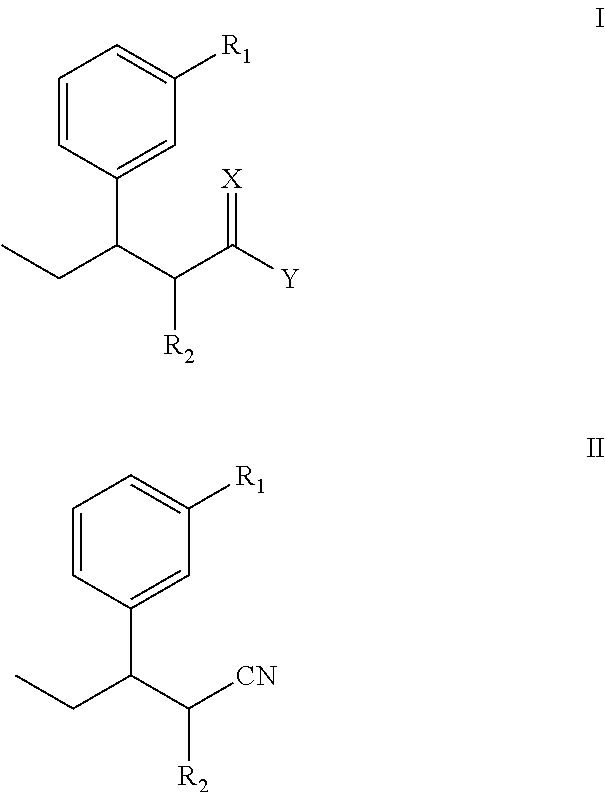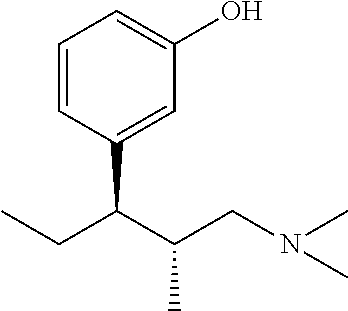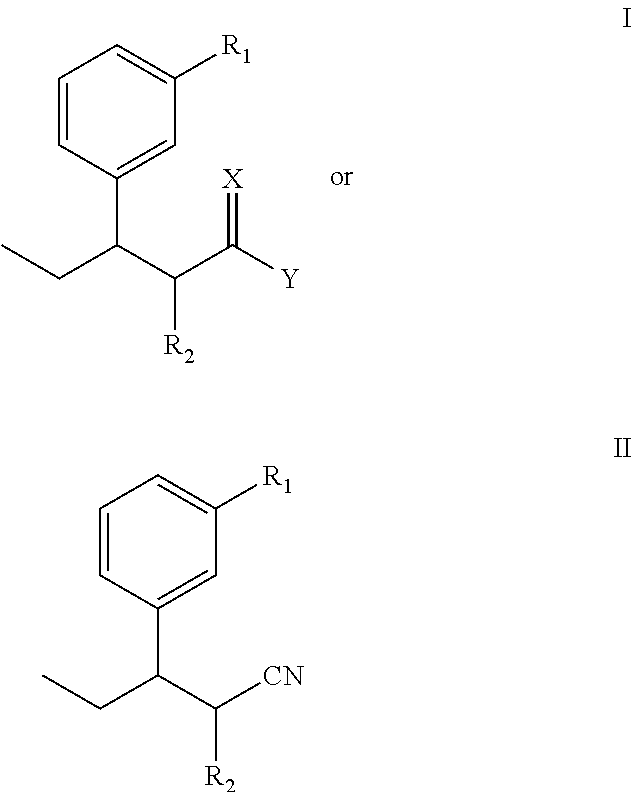Intermediate used for preparing tapentadol or analogues thereof
a technology of intermediates and tapentadol, which is applied in the field of pharmaceutical preparations, can solve the problems of difficult to produce analgesic tolerance and physical dependence compared with morphine, excessive strong chloridizing agents, and thionyl chloride, and achieves the effects of improving the product yield of tapentadol, reducing production costs, and simplifying production procedures
- Summary
- Abstract
- Description
- Claims
- Application Information
AI Technical Summary
Benefits of technology
Problems solved by technology
Method used
Image
Examples
embodiment 1
Preparation of diethyl 2-(3-methoxphenyl) propylmalonate
[0062]The steps are: add diethyl methylmalonate and anhydrous DMF into a reaction flask, stir well, T=40, add NaH, after 1-hour consecutive reaction dip the DMF solution of 3-(1-bromopropyl) anisole while stirring, stir at 85 for 18 hours, track that the reaction is substantially completed by TLC (developer: petroleum ether / ethyl acetate (8:1)), pour the reaction product in the water, perform extraction by ethyl acetate until the water layer is not fluorescent, wash the organic layer twice by water without drying to obtain a yellow oily product after decompression and concentration, i.e., diethyl 2-(3-methoxphenyl) propylmalonate.
[0063]Molecular formula: C18H26O5, molecular weight: 322.4, MS(m / z): 322.
[0064]Elementary analysis: theoretical values: C, 67.06%; H, 8.13%; measured values: C, 67.16%; H, 8.19%.
embodiment 2
Preparation of 2-methyl-3-(3-methoxyphenyl) valeric acid
[0065]The steps are: add diethyl 2-(3-methoxphenyl) propylmalonate, ethanol and water into a reaction flask, adjust the pH value to 14 by sodium hydroxide after stirring them well, perform heating reflux reaction, track the reaction by TLC, keep the pH value of the solution at 14, (developer: petroleum ether / ethyl acetate (4:1)), distil ethanol by decompression, and perform extraction twice by ethyl acetate to separate an organic layer out; adjust the pH value of the water layer to 2 to 3 by an acid, perform extraction by ethyl acetate, separate organic layers out, combine the organic layers, and perform drying by anhydrous magnesium sulphate to obtain a yellow oily product after decompression and concentration; add the yellow oily production in a three-neck flask, reflux and heat it in an oil bath of 15 for 5 hours, pour the resultant into the sodium hydroxide solution to make the pH become alkaline, and exact the undissolved ...
embodiment 3
Preparation of 2-methyl-3-(3-hydroxyphenyl) valeric acid
[0070]The steps are: add 2-methyl-3-(3-methoxyphenyl) valeric acid into a reaction flask, add hydroiodic acid, and perform heating and reflux for 12 hours; detect the reaction process by TLC; after that, cool the resultant to the room temperature, pour it into an alkaline solution to make the pH become 9, perform extraction by ethyl acetate, reversely adjust the pH of the water layer to about 3.0 after the water layer is separated out, and add ethyl acetate for extraction; and dry the ethyl acetate extracting solution by anhydrous magnesium sulphate, and recycle the solvent by decompression to obtain a light yellow liquid, 2-methyl-3-(3-hydroxyphenyl) valeric acid.
[0071]Molecular formula: C18H26O5, molecular weight: 208.3, MS(m / z): 209 (M++H).
[0072]Elementary analysis: theoretical values: C, 69.21%; H, 7.74%; measured values: C, 65.35%; H, 7.56%.
PUM
 Login to View More
Login to View More Abstract
Description
Claims
Application Information
 Login to View More
Login to View More - R&D
- Intellectual Property
- Life Sciences
- Materials
- Tech Scout
- Unparalleled Data Quality
- Higher Quality Content
- 60% Fewer Hallucinations
Browse by: Latest US Patents, China's latest patents, Technical Efficacy Thesaurus, Application Domain, Technology Topic, Popular Technical Reports.
© 2025 PatSnap. All rights reserved.Legal|Privacy policy|Modern Slavery Act Transparency Statement|Sitemap|About US| Contact US: help@patsnap.com



